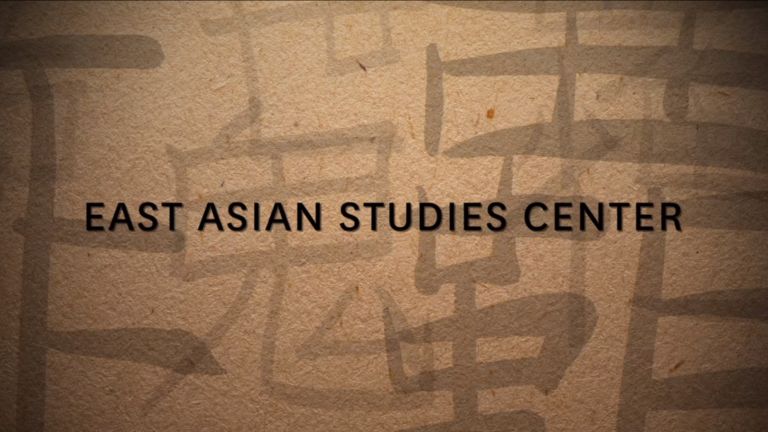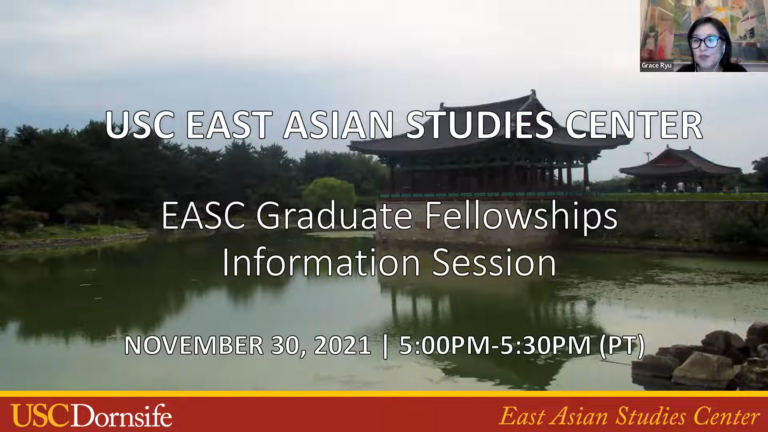East Asian Studies Center
Videos
Filter
December 1, 2021 | The East Asian Studies Center hosted an information session for graduate students interested in applying for EASC Graduate Fellowships, including the ACE-Nikaido Fellowship.
EASC Graduate Fellowships provide summer stipends, typically between $1,000-$3,000, depending on the proposed course of study. The purpose of the award is to advance understanding of East Asia and/or US-Asia relations. Awards are given based on the quality of the proposed project and budgets submitted with the application. The award may be used for research, language training or area studies, and can also be used for research including Asia in a comparative context or as a case study.
November 12, 2021 | The USC East Asian Studies Center has launched another EASC New Book Series for the wider community. This series is organized by Li-Ping Chen, Postdoctoral Scholar & Teaching Fellow in the USC East Asian Studies Center. This monthly series on Zoom will introduce recent publications in Sinophone studies to the USC community and the wider public. This session featured a discussion on Writing Pirates: Vernacular Fiction and Oceans in Late Ming China (University of Michigan Press, 2021) with author Yuanfei Wang (Visiting Fellow at the University of Southern California) and discussant Xing Hang (Associate Professor of History, Brandeis University).
November 1, 2021 | For decades, historians have debated the question of whether concepts equivalent to race and racism existed in premodern Chinese ethnic discourse. Unfortunately, this discussion has been hindered by reliance on an inadequate nineteenth-century practice of classifying identities as racial, cultural, or national. In this talk, Professor Yang proposes a new conceptual framework for analyzing imperial Chinese ethnic discourses and argue that certain discourses previously characterized as racist could be more usefully interpreted as two distinct but related traditions of foreign relations thinking that he terms “civilization-state discourse” and “Chinese supremacism.” He also argues that “structural/systemic/institutional racism”—as understood by critical race theory (CRT) scholars in terms of institutionalized, legally enforced hierarchies of ethnic inequality within a state—did not exist in periods when the “Han” Chinese majority was dominant but did exist in some periods of minority (e.g., Mongol and Manchu) rule, albeit in a form mitigated by universalistic official rhetoric.
October 26, 2021 | The USC East Asian Studies Center has launched an EASC New Book Series for the wider community. This series focusing on Sinophone Studies is organized by Li-Ping Chen, Postdoctoral Scholar & Teaching Fellow in the USC East Asian Studies Center. this event featured a discussion on The Chinese Atlantic: Seascapes and the Theatricality of Globalization (Indiana University Press, 2020) with author Sean Metzger (Professor in the School of Theater, Film and Television, University of California, Los Angeles) and discussant Lok Siu (Associate Professor in Asian American and Asian Diaspora Studies, University of California, Berkeley).
October 21, 2021 | This information video goes over program information about the Spring 2022 Global East Asia Maymester programs, including a step-by-step guide on how to apply.
Global East Asia (GEA) is a four week upper-division Maymester research course with a study abroad component for USC undergraduate students, made possible by the East Asian Studies Center and USC Dornsife. This intensive program gives students the opportunity to travel and conduct research in China or Japan. Students from all majors, schools and language backgrounds are eligible to apply and experience East Asia in a unique way.
September 24, 2021 | The USC East Asian Studies Center has launched another EASC New Book Series for the wider community. This series is organized by Li-Ping Chen, Postdoctoral Scholar & Teaching Fellow in the USC East Asian Studies Center. This monthly series on Zoom will introduce recent publications in Sinophone studies to the USC community and the wider public. The first event in this series featured a discussion on Becoming Taiwanese: Ethnogenesis in a Colonial City, 1880s to 1950s (Harvard University Press, 2019) with author Evan N. Dawley (Associate Professor of History, Goucher College) and discussant Ping-hui Liao (Professor of Literary and Critical Studies, University of California, San Diego).
September 15, 2021 | Race/Solidarity: Transpacific Conversations & Anthropology Colloquium Series present Uyghur Visions: Two Films by Mukaddas Mijit. Featuring filmmaker Dr. Mukaddas Mijit (via Zoom), in conversation with Professor Jenny Chio (East Asian Languages and Cultures/Anthropology). In this event, filmmaker Dr. Mukaddas Mijit will share two short films that reflect upon contemporary Uyghur identity in light of both shifting personal relationships and the devastating political transformations that have upended life for Uyghur communities around the globe. The films are followed by a Q&A with Dr. Mijit, facilitated by Professor Jenny Chio. Films:
Moman, The Great Woman (2012)
“The boy gave all three bread to the poor and didn’t keep any for himself. Then a snake flew out of his bag into the sky.”
--Rehime Kamal.
A video diary about my grandmother.
“Morning Feeling” and Perhat Tursun (2021).
A visual essay on a contemporary Uyghur poem about isolation, physical and psychological oppression.
April 16, 2021 | The USC East Asian Studies Center has launched an EASC New Book Series for the wider community. This series focusing on modern China is organized by Li-Ping Chen, Postdoctoral Scholar & Teaching Fellow in the USC East Asian Studies Center.
This monthly series on Zoom will introduce some of the latest publications in modern Chinese studies to the USC community and the wider public.
Diaspora’s Homeland: Modern China in the Age of Global Migration (Duke University Press, 2018)
AUTHOR: Shelly Chan (Associate Professor of History at the University of California, Santa Cruz)
DISCUSSANT: Huei-Ying Kuo (Associate Research Professor of Sociology, Johns Hopkins University)
April 8, 2021 | As part of the 2020-21 EASC Guest Speaker Series, USC Assistant Professor of Religion, Jessica Zu has invited Dr. Larry Ward, co-founder of The Lotus Institute and author of America’s Racial Karma: An Invitation to Heal. This lecture will tie in Prof. Zu's REL 342: Buddhist Modernism. This course seeks to cover not only the common perception of Buddhism as psychological therapy, McMindfulness style of self-help, and part of the New Age Spirituality but also the less studied engaged Buddhism that sought to make Buddhism a civil religion.
Engaged Buddhism is an important branch of new Buddhist movements that emerged around the world in the mid-twentieth century. However, in America today, engaged Buddhists seem to have poised to become the leaders in using Buddhist spirituality to fight for social justice, to cure collective racial trauma, and to dismantle lasting structural oppressions.









